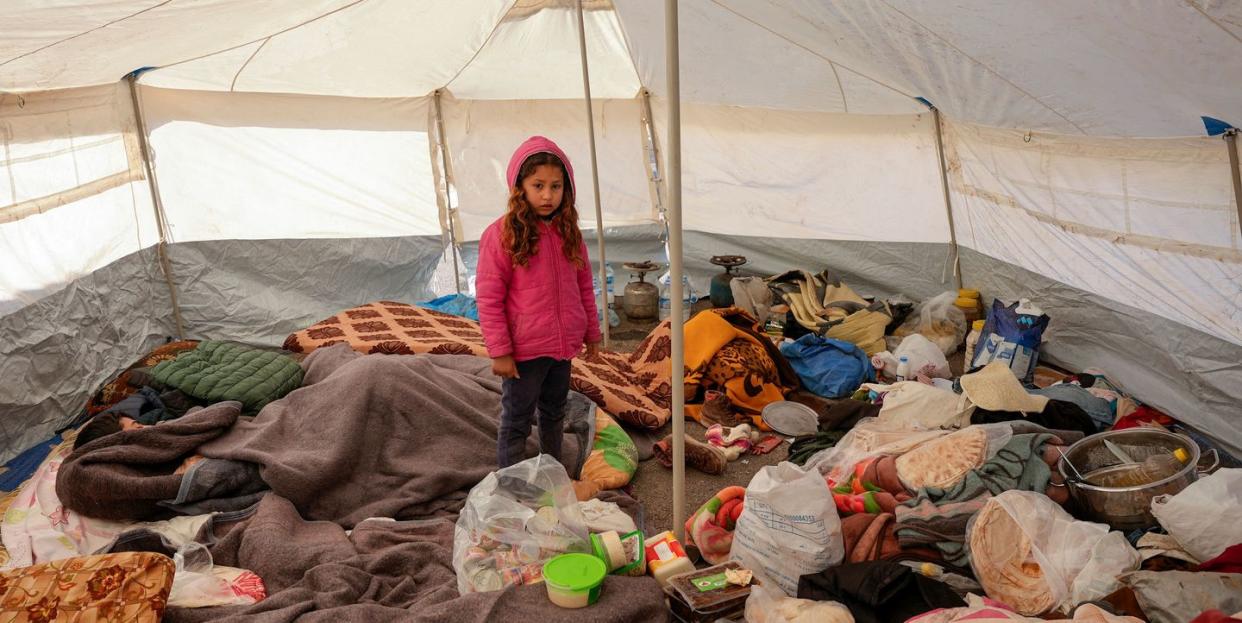Women and girls will be at the sharpest end of Turkey and Syria's earthquake impact

On the 6 February, an earthquake of cataclysmic force fractured southern Turkey and northern Syria. Rupturing the ground close to the border of the interlocked countries, it was closely followed by a second, which struck in the hours afterwards. The world-shattering scale of the impact for the people living in these regions is hard to comprehend.
What has happened in Turkey and Syria?
The latest numbers state that the death toll from the disaster has passed the 17,000 mark. According to the Turkish government, 380,000 people are seeking refuge in government shelters or hotels.
Speaking to WH from Beirut, Lebanon, Sabine Abi Aad, communications lead for charity ActionAid Arab Region said: ‘Most of the people affected are refugees from the Syrian conflict, who have fled or have been displaced within Syria. This means that these people have been already displaced multiple times and have now experienced another huge blow, with their homes and livelihoods been destroyed by the disaster.’
The horror of the situation is being needled by extreme weather. Search and rescue teams are against heavy rain and freezing temperatures as they struggle to free survivors from the wreckage. The winter cold, Abi Aad said, represents an added struggle for people who have lost their homes (over 6,000 buildings have fallen) as they try to get through each passing day.
Why females are particularly at risk in emergencies
In emergencies, women and girls are often at particular risk. From work responding to disasters such as the 2011 and 2015 Haiti and Nepal earthquakes, Abi Aad has recognised certain patterns.
For one, turbulent environments in which food and shelter are scarce mean a greater risk of sexual exploitation. When it comes to women and girls whose privacy has been annihilated in the loss of their homes, whose families may be dead or injured, and who are out on the streets alone, this threat is a sinister daily presence. Child marriage, too, becomes more likely, when means have been exhausted and a family feels they have nothing left to provide for a daughter.
In situations of dire stress, statistically, domestic violence rises, meaning a woman's risk of being hurt by someone inside her own family is raised. Women typically hold the vast majority of the domestic load, caring for children as well as the elderly. In a crisis situation, this burden becomes heavier.
And the reality of life as a woman – the need for period products, for adequate care in pregnancy and enough nutrients for breastfeeding, to take some examples – is sometimes not recognised if those leading humanitarian teams are largely male.
Something that can be done here, Abi Aad details, is elevating women in crisis zones. ‘Women need to be at the centre of emergency responses. Because a woman understands what a woman needs, they can advocate for their necessities. More money should be given to female-led organisations, and we need more humanitarian female workers on the ground.’
Right now, though, there are things you can do to support the people of Turkey and Syria.
How can you help?
Donate
Money is tight for a lot of people right now. But if you do have some to spare, know that ActionAid is a member of The Disasters Emergency Committee (DEC) who have launched an appeal to raise urgent funds to help people affected.
Donate online at: dec.org.uk
Text: message 'SUPPORT' to 70787 to donate £10
You can also donate to the White Helmets, who are responding to the fallout from the earthquake in Syria. Make a one off or regular donation to their life-saving work here.
Your cash can help to fund medical treatment for injured people, shelter for those who have lost their homes and warm clothes and heaters, as well as food and clean water.
Keep the conversation going
Sharing news of the crisis online, sharing links to donate: this all helps to keep the disaster frond and centre and encourages more money towards organisations helping.
You Might Also Like


